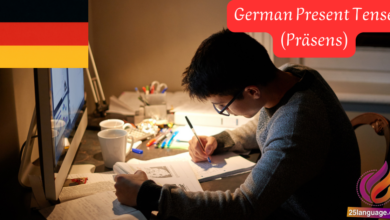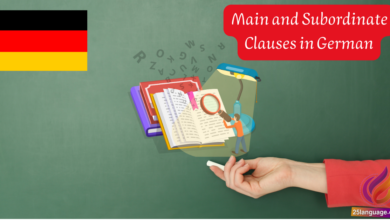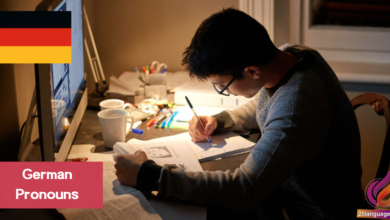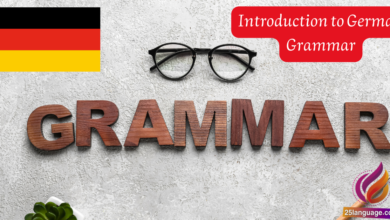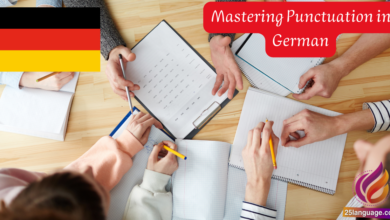German Regular and Irregular Verbs
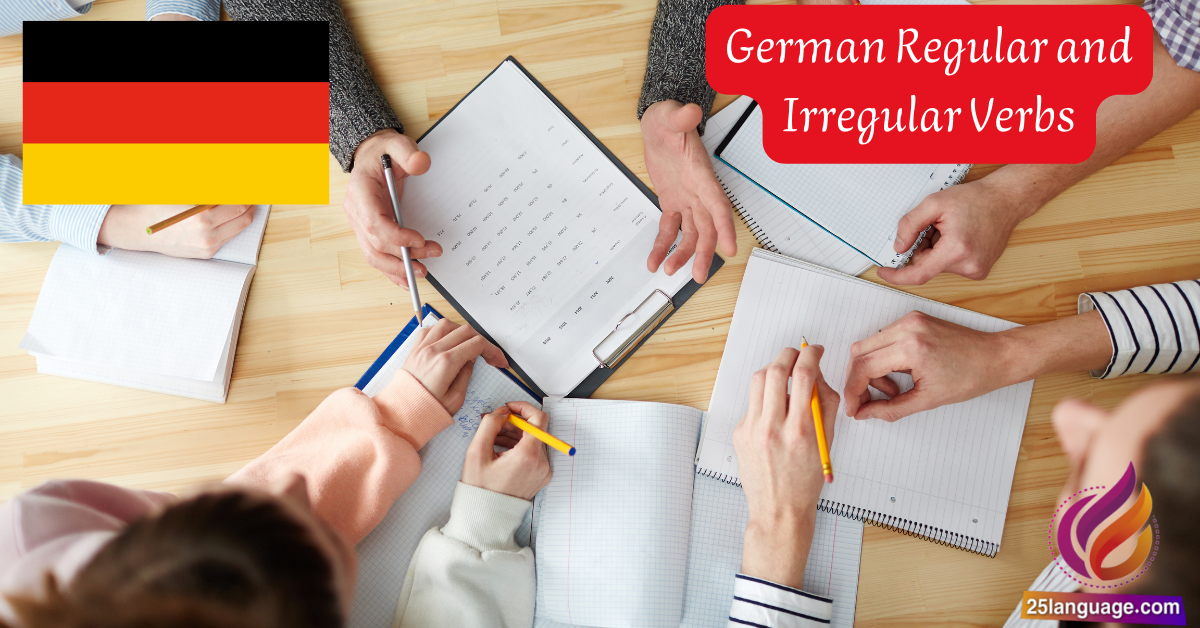
Dive into the engaging world of German verbs, where understanding their patterns can unlock the ability to communicate with confidence! In this lesson, we’ll explore the dance between german regular and irregular verb s—two key players in constructing sentences. By mastering these essential building blocks, you’ll enhance your fluency and open doors to a richer vocabulary. Let’s unveil the secrets behind verb conjugation and elevate your German skills to new heights!
Understanding German Regular Verbs: Foundations and Patterns
In German, regular verbs follow a predictable pattern when conjugated, making it easier for English-speaking learners to understand their structure. The basic structure of a regular verb in the present tense involves dropping the “-en” from the infinitive form and adding specific endings based on the subject of the sentence. The endings for regular verbs are as follows:
- ich (I) -e
- du (you,singular informal) -st
- er/sie/es (he/she/it) -t
- wir (we) -en
- ihr (you,plural informal) -t
- sie/Sie (they/you,formal) -en
For example,the verb spielen (to play) is conjugated as follows:
- ich spiele (I play)
- du spielst (you play)
- er/sie/es spielt (he/she/it plays)
- wir spielen (we play)
- ihr spielt (you all play)
- sie/Sie spielen (they/you formal play)
Knowing these patterns allows learners to confidently conjugate regular verbs,aiding in constructing correct sentences.
| German Verb (Infinitive) | Conjugated Forms | English Translation |
|---|---|---|
| spielen | ich spiele,du spielst,er/sie/es spielt | I play,you play,he/she/it plays |
| lernen | ich lerne,du lernst,er/sie/es lernt | I learn,you learn,he/she/it learns |
| arbeiten | ich arbeite,du arbeitest,er/sie/es arbeitet | I work,you work,he/she/it works |
Regular verbs present a stable framework for sentence construction. As an example, consider the verb machen (to do/make):
- ich mache (I do/make)
- du machst (you do/make)
- er/sie/es macht (he/she/it does/makes)
- wir machen (we do/make)
- ihr macht (you all do/make)
- sie/Sie machen (they/you formal do/make)
By practicing these patterns with various verbs, learners can build their fluency in foundational aspects of German grammar.
Exploring Irregular Verbs in German: Key variations and Usage
In German,irregular verbs (unregelmäßige Verben) do not follow the typical conjugation patterns,which can make them challenging for learners. It’s essential to recognize that many common verbs are irregular, and understanding their variations is crucial for effective communication. Here are some examples of common irregular verbs:
- sein (to be): ich bin (I am),du bist (you are),er/sie/es ist (he/she/it is).
- haben (to have): ich habe (I have), du hast (you have), er/sie/es hat (he/she/it has).
- gehen (to go): ich gehe (I go), du gehst (you go), er/sie/es geht (he/she/it goes).
Each of these verbs undergoes unique changes that deviate from the standard conjugation ends. As an example, while regular verbs in the present tense typically use the infinitive form in combination with standard endings (-e, -st, -t, etc.), irregular verbs can have vowel changes. Such as, the verb sehen (to see) conjugates as follows: ich sehe (I see), du siehst (you see), er/sie/es sieht (he/she/it sees).Below is a summary of other common irregular verbs to familiarize you with their conjugation:
| german Verb | Conjugation (Present Tense) | English Translation |
|---|---|---|
| essen | ich esse, du isst, er/sie/es isst | to eat |
| lesen | ich lese, du liest, er/sie/es liest | to read |
| fahren | ich fahre, du fährst, er/sie/es fährt | to drive/go |
| laufen | ich laufe, du läufst, er/sie/es läuft | to run |
Practical Tips for Mastering German Verbs: Strategies for Success
Mastering German verbs involves understanding their conjugation and usage within sentences. In German, verbs are conjugated based on the subject and tense, which can seem daunting but follows systematic patterns. Here are a few key points to consider:
- Regular verbs</: Most regular verbs follow a predictable pattern. For instance, the verb spielen (to play) is conjugated as:
- ich spiele (I play)
- du spielst (you play)
- er/sie/es spielt (he/she/it plays)
- wir spielen (we play)
- ihr spielt (you all play)
- sie/Sie spielen (they/you formal play)
- Irregular verbs: Unlike regular verbs, irregular verbs change their stems. For example, sein (to be) conjugates as:
- ich bin (I am)
- du bist (you are)
- er/sie/es ist (he/she/it is)
- wir sind (we are)
- ihr seid (you all are)
- sie/Sie sind (they/you formal are)
Another essential aspect of German verbs is the use of auxiliary verbs in forming various tenses. The most common auxiliary verbs are haben (to have) and sein. They are used to create the perfect tense, which signifies actions that have been completed. Here’s a simple table highlighting how to construct the perfect tense:
| German Example | Auxiliary Verb | Past Participle | English Translation |
|---|---|---|---|
| Ich habe gespielt | haben | gespielt | I have played |
| Er ist gegangen | sein | gegangen | He has gone |
| Wir haben gelernt | haben | gelernt | We have learned |
Real-Life Applications of German verbs: From Classroom to Conversation
In German, verbs play a crucial role in constructing meaningful sentences. Understanding how to conjugate and use these verbs in real-life applications enhances communication skills. Verbs in German change according to the subject,tense,and mood. Here’s a rapid breakdown of the types of verbs you’ll encounter:
- Regular Verbs: These follow a predictable pattern when conjugated. For example, “spielen” (to play) changes to “ich spiele” (I play) in the present tense.
- Irregular Verbs: These verbs do not follow the regular conjugation pattern. For example, “sehen” (to see) changes to “ich sehe” (I see).
- Modal Verbs: These verbs express necessity or possibility,such as “müssen” (must) and “können” (can). As an example, “Ich kann Deutsch sprechen” means “I can speak German.”
each of these verb categories has real-life applications in everyday conversation. Such as, you might say “Ich kaufe ein” (I’m shopping) when entering a store, illustrating the practical use of the verb “kaufen” (to buy). Another common phrase is “Wir gehen ins Kino” (We are going to the cinema), where the verb “gehen” (to go) is used to discuss plans. Using these verbs correctly can definitely help you describe actions, intentions, and experiences fluently, making your conversations more engaging and authentic.
| German Verb | Type | Example | Translation |
|---|---|---|---|
| spielen | Regular Verb | Ich spiele Fußball. | I play soccer. |
| sehen | Irregular Verb | ich sehe einen film. | I see a movie. |
| müssen | Modal Verb | Wir müssen lernen. | We must learn. |
| gehen | Regular Verb | Sie gehen zur Schule. | They go to school. |
Insights and Conclusions
Zusammenfassung und ausblick
Herzlichen Glückwunsch! Sie haben erfolgreich die Grundlagen der regelmäßigen und unregelmäßigen Verben im Deutschen erkundet. Heute haben wir gelernt, dass regelmäßige Verben nach einem vorhersehbaren Muster konjugiert werden, während unregelmäßige Verben besondere Formen annehmen, die das Lernen manchmal herausfordernd, aber auch spannend machen.
Denken Sie daran, dass die regelmäßige Übung der Schlüssel ist, um diese Verben zu meistern. Versuchen Sie, beim Sprechen oder schreiben auf Deutsch, die neuen Verben einzusetzen.Zeigen Sie sich selbst Geduld, da das Konjugieren am Anfang vielleicht kompliziert erscheint, aber mit jedem Versuch werden Sie sicherer. Nutzen Sie die Vielfalt der deutschen Sprache, hören Sie Musik, schauen Sie Filme oder lesen Sie Bücher – all dies wird Ihre Verbenkenntnisse stärken.
Lassen Sie sich nicht entmutigen, wenn Sie Fehler machen; sie sind ein wichtiger Teil des Lernprozesses. Jeder Schritt,den Sie machen,bringt Sie näher an Ihr Ziel. Bleiben Sie motiviert und neugierig! Die Welt der deutschen Sprache bietet unendliche Möglichkeiten, und Sie sind auf dem besten weg, sie zu entdecken.
Viel Erfolg beim Üben, und denken Sie daran: Übung macht den meister! Bis zur nächsten Stunde!






